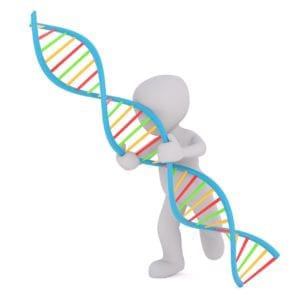Kabuki Syndrome
What is Kabuki syndrome?
Kabuki syndrome is a rare multisystem disorder that is characterized by multiple abnormalities including distinctive facial features, growth delays, varying degrees of intellectual disability, skeletal abnormalities, and short stature. However, a wide range of additional symptoms that affect multiple different organ systems can also potentially occur. The disorder was originally called Kabuki-makeup syndrome because the facial features of many affected children resembled the makeup used by actors in kabuki, which is a form of Japanese theater. Since then, the term “makeup” has been dropped.What causes Kabuki syndrome?
So far, it is known that a mutation in one of two genes leads to Kabuki syndrome: most commonly, the KMT2D gene, but also the KDM6A gene. Most cases of Kabuki syndrome occur because of a spontaneous mutation in one of these genes, but familial occurrence of the disorder has been reported. This inheritance can occur in an autosomal dominant pattern.What are the symptoms of Kabuki syndrome?
The specific symptoms that are associated with Kabuki syndrome vary greatly from one affected individual to another. Some features of the condition are present and birth, and others become apparent as the child ages. Particularly, the distinctive facial appearance of affected individuals, of which the disease was named, include the following features that develop slowly over several years:- Abnormally long openings between the eyelids
- Lower eyelids that are turned outward
- Prominent eyelashes
- Arched eyebrows
- Broad nose with a flattened or depressed tip
- Large, misshaped ears
- Growth deficiency and short stature
- Mild to moderate intellectual disability
- Seizures and diminished muscle tone
- Feeding difficulties, such as gastroesphogeal reflux, poor sucking ability, and difficulty absorbing or digesting nutrients from food
- A variety of dental and/or skeletal malformations
How is Kabuki syndrome diagnosed?
A diagnosis of Kabuki syndrome can be diagnosed based on a thorough clinical evaluation, with a detailed patient history and an identification of the characteristic findings of the disease. Clinical genetic testing is also available to confirm a diagnosis, but about 30% of individuals with Kabuki syndrome will not show a mutation in the KMT2D gene nor the KDM6A gene. In these cases, physicians will look for four of the five following characteristic findings of the condition to confirm a diagnosis:- Distinctive facial features
- Skeletal abnormalities
- Intellectual disability
- Dermatoglyphic abnormalities, such as persistent fetal finger pads
- Postnatal short stature
What are the available treatments for Kabuki syndrome?
Because Kabuki syndrome is a multisystem disorder, treatment of the condition is directed toward the specific symptoms that are apparent in each individual and are each treated by their appropriate specialist. In general, special education, physical and occupational therapy, speech therapy, and sensory integration therapy may be beneficial.Where can I find more information on Kabuki syndrome?
Kabuki Syndrome Articles

This Kabuki Syndrome Patient is Making Waves in Golf
According to a story from the Rancho Santa Fe Review, 26-year-old Tyler Schutz began taking the sport of golf by storm last year. The young

Girl with Kabuki Syndrome Has Waited 3 Years for Knee Surgery
When the COVID-19 pandemic swept the world, nobody knew what the short- or long-term effects would be. Now, a few years into the pandemic,

October 23 is Kabuki Syndrome Awareness Day: Five Facts You Should Know
October 23 is recognized each year as Kabuki Syndrome Awareness Day, a time to help spread awareness about this syndrome among the general public and

October 23 is Kabuki Syndrome Awareness Day: Five Facts You Should Know
October 23 is recognized each year as Kabuki Syndrome Awareness Day, a time to help spread awareness about this syndrome among the general public and

RSC-57 for Kabuki Syndrome Receives Orphan Drug and Rare Pediatric Disease Designations
Just over a week ago, drug discovery and development company Rescindo Therapeutics Inc. (“Rescindo”) shared that its drug candidate RSC-57 received both Orphan Drug and

Karate Kid Actors Send Well Wishes to Child with Kabuki Syndrome
Landon Groves was diagnosed with Kabuki syndrome, a rare multisystem disorder, and leukemia soon after his birth. Because of these conditions, his family faces hefty

A Four Year Old With Kabuki Syndrome Started School This Year
According to a story from Kent Online, like many other four year olds around the world, Olivia Wilkes will start attending school this year. However,

Epigenetic Test Developed in UK Could Help Diagnose Genetic Disorders
According to the publication from the London Free Press, a new technique in development at Lawson Health Research Institute uses epigenetics to more closely study






